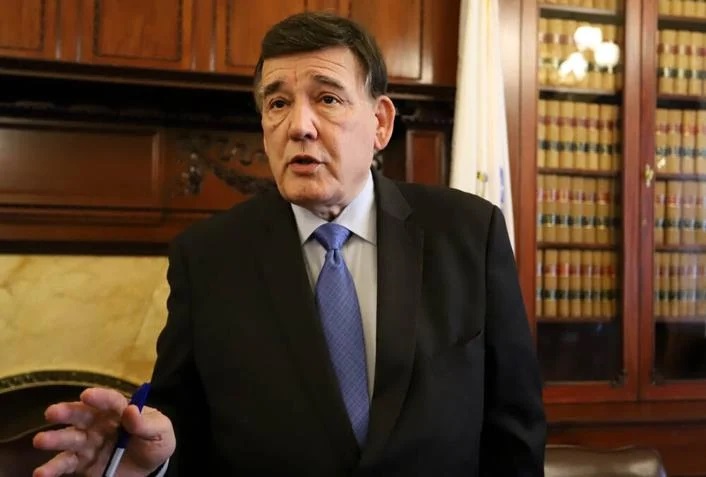latest
Massachusetts lawmakers: Immigrants can plug gaping labor force voids

SEPT. 21, 2023…..With Massachusetts straining under an overburdened emergency shelter system and staring down a shortfall of workers, a group of more than 60 Bay State lawmakers is sending a letter urging the White House and Congress to work with haste to find a bipartisan solution that can address the “dual crises of a dysfunctional immigration system and a rapidly-devolving domestic workforce shortage.”
Spearheaded by Senate Dean Marc Pacheco of Taunton and signed by a bipartisan clutch of 64 legislators, the letter makes the case that Massachusetts’ state of emergency — declared last month as the combination of homeless families and immigrants newly arriving to the country pushed the emergency shelter system to its limits — is the result of decades of federal inaction around immigration policy and federal foot-dragging when it comes to clearing immigrants to work here.
With plentiful hyperlinks and a blend of specific national and Massachusetts data points, the letter makes the case that the American economy has come out the other side of the COVID-19 pandemic showing its resilience, but that Washington, D.C., needs to keep a more active hand on the tiller as companies of all sizes struggle to find enough workers to keep that momentum going.
“Virtually every sector of the United States economy, however, is now grappling with ongoing labor shortages. According to the latest population and demographic data, these shortages will continue to stunt our growth and become even more urgent if left unaddressed,” the legislators wrote. “At the same time, our outdated federal immigration system is in desperate need of reform. Our country needs a functional gateway at the border that safeguards our national security from illegal entrants while providing noncitizens seeking lawful entry a practical means of obtaining approval to reside and find gainful employment.”
The letter from lawmakers mirrors efforts that the Healey administration has undertaken to convince federal policymakers that they need to help states like Massachusetts where shelter systems and public programs are being squeezed in part because of an influx of newly arriving immigrants. Massachusetts can only do so much, the governor and lawmakers argue, when the root causes of the problem are firmly within the federal government’s purview.
As of Tuesday, there were 6,528 families housed in hotels and emergency assistance shelters, according to Healey’s office. That’s a nearly 18 percent increase since Aug. 6, two days before Healey declared a state of emergency around the crisis. The governor said Wednesday that close to half of the roughly 22,000 people housed in the state’s shelter system are new arrivals from other countries, up from about a third weeks ago.
In the challenge of sheltering all the new arrivals, the lawmakers said they see an opportunity to address the persistent labor shortage that frustrates businesses here and threatens to stall the state’s progress on a number of fronts.
Massachusetts currently has 92,049 workers available for 243,000 vacant jobs and only 47 workers available for every 100 job openings, according to the United States Chamber of Commerce. And nationally there are 9.8 million job openings and only 5.9 million unemployed workers.
Nearly all transit agencies reported experiencing a workforce shortage in a late 2022 survey, the lawmakers noted, and 84 percent of agencies said the shortage is affecting their ability to provide service. The Health Policy Commission reported vacancy rates in 2022 of 56 percent for licensed practical nurses, 32 percent for mental health workers, and 13.6 percent for registered nurses. And the Mass. Clean Energy Center said this summer that 38,100 more workers need to be trained and ready to work on climate projects if the state is going to meet its critical 2030 emissions reduction requirement.
And Massachusetts isn’t producing as many workers as it used to. Citing the National Center on Health Statistics, the lawmakers said that the national fertility rate has fallen 15.9 percent from its average between 2000-2010 and the Massachusetts statewide birth rate has fallen 28.1 percent since 1990, “and demographic data collectively indicates critical workforce shortages are on pace to continue to grow.”
But while the combination of people seeking authorization to enter the United States and undocumented immigrants already living here “represent an abundance of potential employees for our domestic workforce,” both the economy and nature of immigration have changed dramatically since the last comprehensive immigration reform act was passed by Congress in 1986, the state legislators said.
The H-1B employer-sponsored immigration system, which authorizes temporary work in cases when employers cannot otherwise obtain needed business skills or abilities from the U.S. workforce, is subject to an annual limit of 65,000 visas (plus 20,000 more for foreign professionals who graduate from U.S. institutions with advanced degrees) established in 1990. Since then, the size of the U.S. economy has more than quadrupled from roughly $6 trillion to more than $25 trillion according to World Bank Open Data, and the Cato Institute said there were 1,438,758 employment-based skilled-worker immigration applications stuck in processing backlogs as of September 2021.
A record 2.4 million undocumented immigrants were apprehended at the U.S. border in fiscal year 2022 according to the United States Customs & Border Protection, the U.S. Department of Homeland Security projects that the population of undocumented immigrants living in the U.S. is roughly 12 million people, and more than 5.2 million applications for every form of legal immigration are pending, according to U.S. Citizens and Immigration Services.
“[A]ccording to a recent Center for American Progress report, providing a pathway to citizenship for eligible and undocumented workers would boost the Gross Domestic Product of the United States by a cumulative total of $1.5 trillion over 10 years and create 400,800 new jobs,” the Massachusetts lawmakers wrote.
So far, state government efforts to compel D.C. to act have not been successful. Healey said Wednesday that her office has not heard back from the feds “to our satisfaction.”
“And we need to, we need to. We need, not just answers, we need response, we need action. And we’ve given them exactly what they need to do. My letter to the White House could not have been more clear in terms of simple steps that could be taken to address this. Also, Congress has an opportunity to act but so far, they’re not willing to,” the governor said. “And we need money. I mean, in talking to my colleagues, other governors across this country, other states, I mean, we’re all feeling it. And, frankly, we’re just having to foot the bill. And it is a big bill to take care of folks who are in this situation. It is the direct failure of the federal government.”
-

 Community6 years ago
Community6 years agoNational Shrine of La Salette Festival of Lights 2017 set to begin
-

 Community6 years ago
Community6 years agoMassachusetts State Police looking for good home for retired dogs
-

 Crime6 years ago
Crime6 years agoFall River ranked most dangerous city in Massachusetts according to report
-

 latest6 years ago
latest6 years agoDurfee student allegedly overdoses on marijuana
-

 Community6 years ago
Community6 years agoVideo of Fall River Police goes viral
-

 Causes6 years ago
Causes6 years agoMissing Fall River woman found deceased
-

 Crime6 years ago
Crime6 years agoFall River Police add names to most wanted list
-

 Causes6 years ago
Causes6 years agoFall River teenager reported missing has been found





BidenHatesAmericans
September 21, 2023 at 6:25 pm
Enforce the Border and the current immigration laws. Stop offering fantastical ideas on how we Americans should absorb this complete disaster which will bring down America and destroy the lives of her CITIZENS…
Kfurtado
September 21, 2023 at 8:05 pm
I remember when the Portuguese immigrants plugged the holes of labor vacancies on the southcoast . And you know what happened? DEPRESSED WAGES ! The whole immigrant family would go to work, not get an education, and throw their wages in to the family pot whereas it would only be one worker in an American family.
RedPilled
September 23, 2023 at 6:03 am
History about to repeat. Portuguese myself the Portuguese are about to have their jobs replaced for cheaper labor. It’s already happening In construction business.